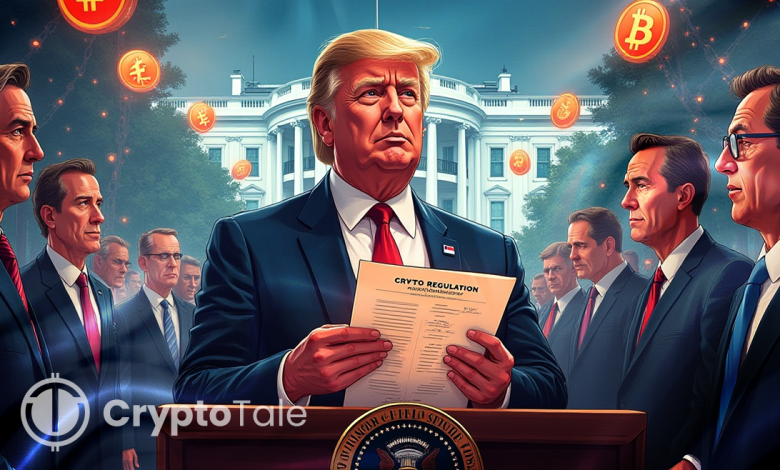Trump’s Crypto Policy Report: Impact on Blockchain, Tokenization, and Stablecoin Governance

- Trump’s crypto working group report focuses on regulation, not adopting crypto as reserves.
- The report proposes a framework for blockchain securities to foster institutional adoption.
- U.S. focuses on creating clear crypto regulations while other nations push for crypto reserves.
The cryptocurrency working group under President Donald Trump is set to release its report on Wednesday. The document will highlight the administration’s approach to digital asset regulation, including tokenization and market structure. This marks the first public disclosure of the group’s work aimed at reshaping U.S. crypto policy.
The working group was created in January and mandated to come up with new controls over the growing crypto industry. It will reveal the stance of the administration on matters like blockchain-powered securities and stablecoin regulation in its report. It will most probably influence subsequent regulatory actions regarding the digital asset market in the U.S.
U.S. Focuses on Regulatory Clarity
The report will likely propose an effective regulatory mechanism for stocks and bonds on blockchain. These new digital assets would be centralized in terms of regulation by the Securities and Exchange Commission (SEC). In case it is implemented, the framework is likely to persuade more institutional investors to venture into the crypto sphere, establishing the position of digital assets in the mainstream.
However, the report is not expected to recommend adopting Bitcoin or other cryptocurrencies as a strategic reserve asset. Unlike countries like El Salvador, which has integrated Bitcoin into its reserves. The U.S. is concentrating on creating regulatory clarity rather than promoting crypto adoption in national reserves. This approach signals a more cautious stance on digital assets compared to other nations.
Key Figures Lead Effort to Define Crypto Regulations
Bo Hines, a Trump administration official, heads the working group. The group also includes Treasury Secretary Scott Bessent, SEC Chair Paul Atkins, and Russell Vought of the Office of Management and Budget. Their goal is to provide the crypto industry with clear regulations that could help clarify whether a crypto asset is considered a security, commodity, or another type of asset.
Rebecca Rettig, Chief Legal Officer at Jito Labs, praised the working group’s upcoming recommendations. She pointed out that while the current regulatory environment has allowed the industry to grow, the new suggestions will offer a more strategic and detailed approach. This would help crypto companies better navigate the U.S. market.
Related: Trump Media Bets $300M on Bitcoin-Linked Options, Sparks Market Integrity Concerns
The legislative attempts to create official guidelines on cryptocurrencies in Congress are also emergent factors that are likely to be mentioned in the report. The Clarity Act, which gained the approval of the House of Representatives, is intended to establish an extensive crypto structure. The Senate is also debating the passage of such a bill, thus showing bipartisanship in favor of regulating the industry.
Such regulatory focus, as opposed to the introduction of crypto reserves, demonstrates a more reserved strategy of the U.S. authorities. Whereas in some countries, cryptocurrencies are considered a reserve asset, the U.S. is working on the establishment of stable and protective legal schemes first. It is unclear whether this strategy will promote or impede long-term innovation in the crypto field.
Trump signed a law that controls stablecoins that are pegged to the dollar in America. This initiative is regarded as a big step forward in tackling the issues of stablecoin governance, which is one of the major concerns in the crypto industry.
The crypto industry welcomes the administration’s efforts, but some argue it focuses too much on regulation. As other nations take bold steps towards adopting cryptocurrencies in their national reserves, the U.S. may be proceeding cautiously. This could result in missing a chance to lead in the global digital asset landscape.




